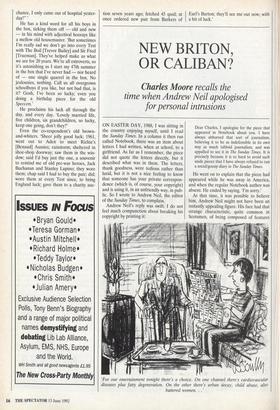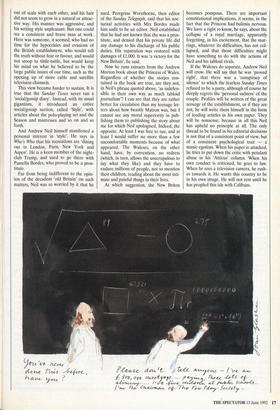NEW BRITON, OR CALIBAN?
Charles Moore recalls the
time when Andrew Neil apologised for personal intrusions
ON EASTER DAY, 1988, I was sitting in the country enjoying myself, until I read the Sunday Times. In a column it then ran called Notebook, there was an item about letters I had written, when at school, to a girlfriend. As far as I remember, the piece did not quote the letters directly, but it described what was in them. The letters, thank goodness, were tedious rather than lurid, but it is not a nice feeling to know that someone has your private correspon- dence (which is, of course, your copyright) and is using it, in an unfriendly way, in pub- lic. So I wrote to Andrew Neil, the editor of the Sunday Times, to complain.
Andrew Neil's reply was swift. I do not feel much compunction about breaking his copyright by printing it:
Dear Charles, I apologise for the piece that appeared in Notebook about you. I have always abhorred that sort of journalism, believing it to be as indefensible in its own way as much tabloid journalism, and was appalled to see it in The Sunday Times. It is precisely because it is so hard to avoid such snide pieces that I have always refused to run a social/gossip diary in The Sunday Times.
He went on to explain that the piece had appeared while he was away in America, and when the regular Notebook author was absent. He ended by saying, 'I'm sorry.'
At that time, it was possible to believe him. Andrew Neil might not have been an instantly appealing figure. His face had that strange characteristic, quite common in Scotsmen, of being composed of features 'For our entertainment tonight there's a choice. On one channel there's cardiovascular diseases plus fatty degeneration. On the other there's urban decay, child abuse, also battered women. . out of scale with each other, and his hair did not seem to grow in a natural or attrac- tive way. His manner was aggressive, and his writing style unpleasant. But one could see a consistent and brave man at work. Here was someone, it seemed, who had no time for the hypocrisies and evasions of the British establishment, who would tell the truth without fear or favour, and would not stoop to tittle-tattle, but would keep his mind on what he believed to be the large public issues of our time, such as the opening up of more cable and satellite television channels.
This view became harder to sustain. It is true that the Sunday Times never ran a `social/gossip diary'. Instead, with its usual gigantism, it introduced an entire social/gossip section, called 'Style', with articles about the polo-playing set and the Season and mistresses and so on and so forth.
And Andrew Neil himself manifested a personal interest in 'style'. He says in Who's Who that his recreations are 'dining out in London, Paris, New York and Aspen'. He is a keen member of the night- club Tramp, and used to go there with Pamella Bordes, who proved to be a pros- titute.
Far from being indifferent to the opin- ion of the decadent 'old Britain' on such matters, Neil was so worried by it that he
sued. Peregrine Worsthorne, then editor of the Sunday Telegraph, said that his noc- turnal activities with Mrs Bordes made him unfit to be an editor. Neil established that he had not known that she was a pros- titute, and denied that his private life did any damage to his discharge of his public duties. His reputation was restored with damages of £1,000. It was 'a victory for the New Britain', he said.
Now he runs extracts from the Andrew Morton book about the Princess of Wales. Regardless of whether the stories con- tained in the book are true, are they not, in Neil's phrase quoted above, 'as indefen- sible in their own way as much tabloid journalism'? I can see that they are rather better for circulation than my teenage let- ters about how beastly Matron was, but I cannot see any moral superiority in pub- lishing them to publishing the story about me for which Neil apologised. Indeed, the opposite. At least I was free to sue, and at least I would suffer no more than a few uncomfortable moments because of what appeared. The Waleses, on the other hand, have, by convention, no redress (which, in turn, allows the unscrupulous to say what they like) and they have to endure millions of people, not to mention their children, reading about the most inti- mate and painful things in their lives.
At which suggestion, the New Briton becomes pompous. There are important constitutional implications, it seems, in the fact that the Princess had bulimia nervosa. We have a right to know, he says, about the collapse of a royal marriage, apparently forgetting, in his excitement, that the mar- riage, whatever its difficulties, has not col- lapsed, and that those difficulties might have something to do with the actions of Neil and his tabloid rivals.
If the Waleses do separate, Andrew Neil will crow. He will say that he was 'proved right', that there was a 'conspiracy of silence' to which the fearless Sunday Times refused to be a party, although of course he deeply regrets the 'personal sadness' of the couple. Profiles will be written of the great scourge of the establishment, or if they are not, he will write them himself in the form of leading articles in his own paper. They will be nonsense, because in all this Neil has upheld no principle at all. The only thread to be found in his editorial decisions is not that of a consistent point of view, but of a consistent psychological trait — a manic egotism. When his paper is attacked, he tries to put down the critic with petulant abuse in his 'Atticus' column. When his own conduct is criticised, he goes to law. When he sees a television camera, he rush- es towards it. He wants this country to be in his own image. He will not rest until he has peopled this isle with Calibans.



















































 Previous page
Previous page